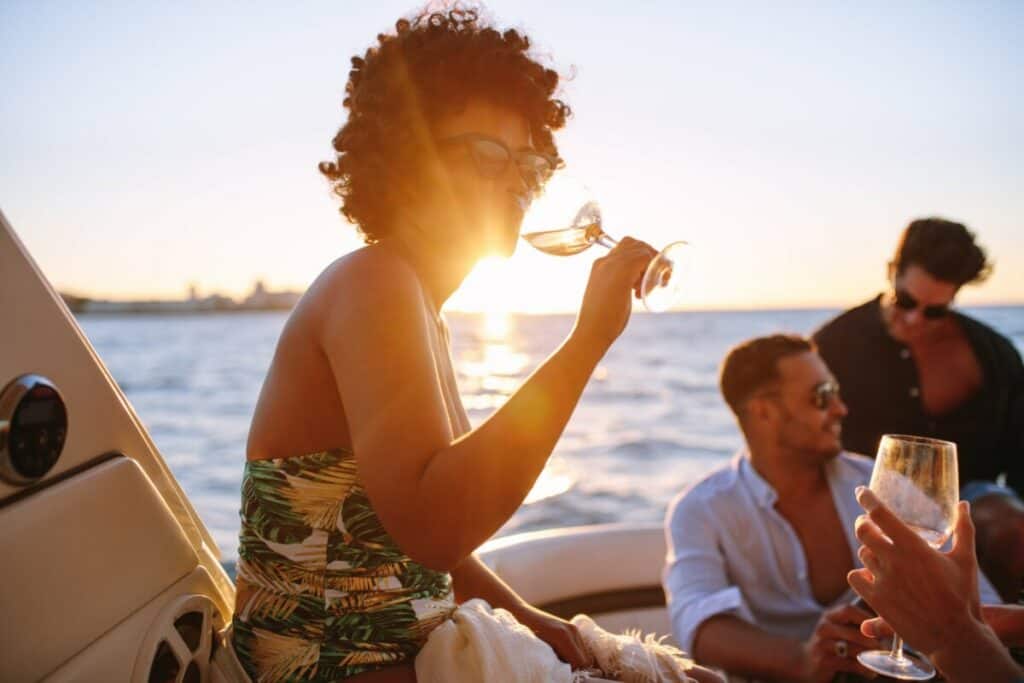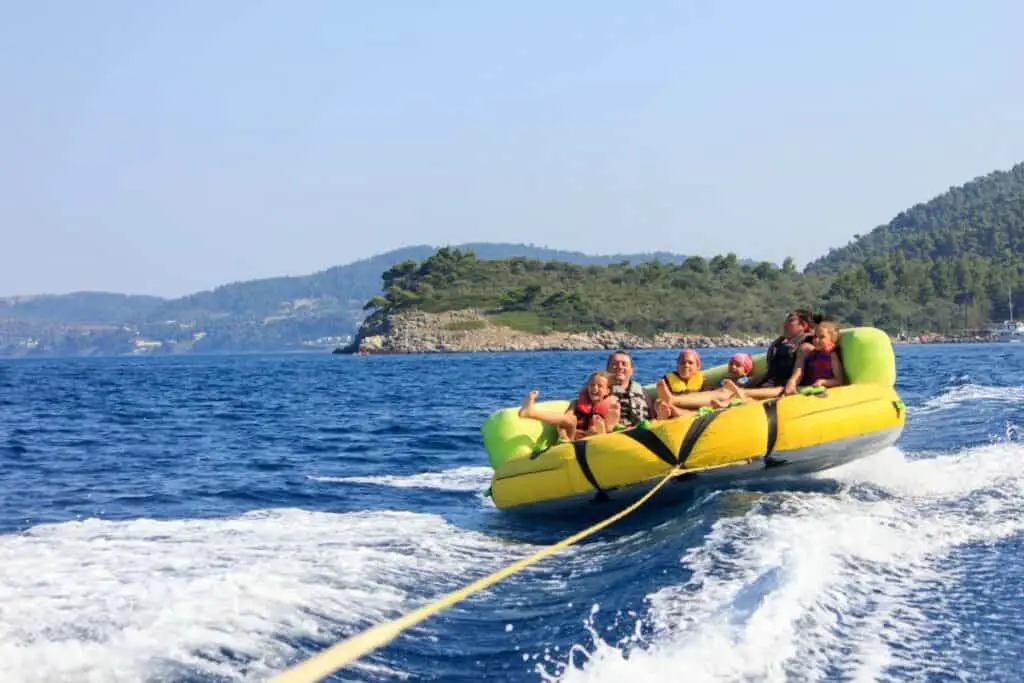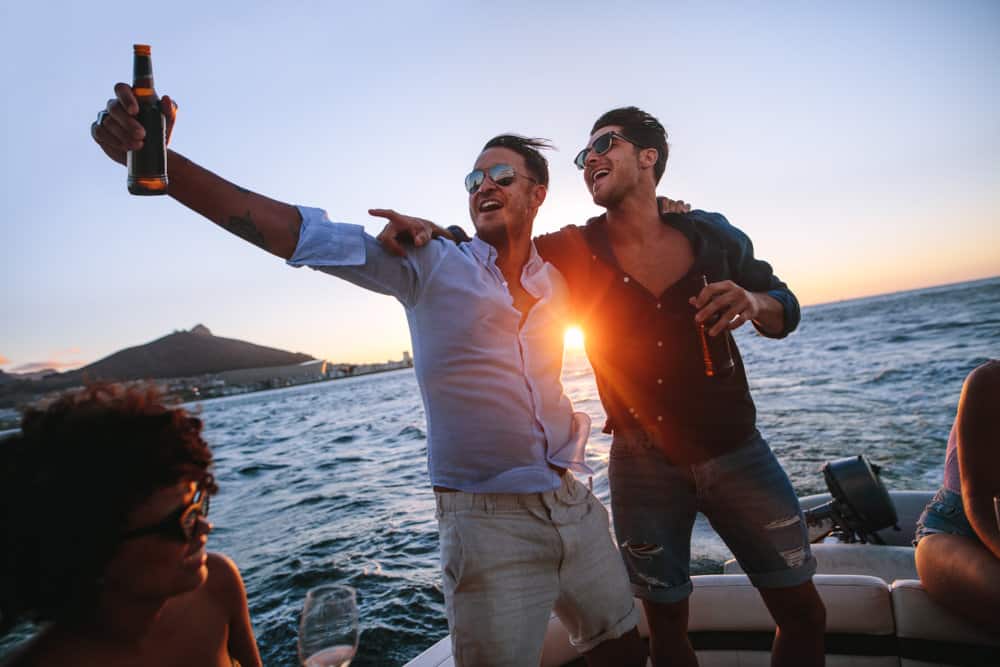Boating is the ultimate summer activity. You can get in the water, be active, tan, and even take a nap, all from a boat. Many people enjoy having a few drinks on the water as well, but could this be dangerous?
Using alcohol on a boat can be dangerous for both boat operators and passengers alike. Alcohol doesn’t work any differently on a boat, but its effects can be enhanced because of the environment. Dehydration, fatigue, and glare from the water can all increase the effects alcohol has on boaters.
Going forward, we will talk more about the safety risks that come from drinking alcohol while on a boat, the dos and don’ts, and the possible penalties you might face for boating under the influence of alcohol.
Does Alcohol Affect You Differently on a Boat?
Chemically, the effect that alcohol has on someone’s body does not change at all, no matter where the person is- on land, in a plane, or on a boat.
However, the circumstances and environment that you are in while boating can mean that alcohol can work more quickly or affect you in different ways. According to the United States Coast Guard,
“A boat operator is likely to become impaired more quickly than a driver, drink for drink.”
– United States Coast Guard
This isn’t due to the type of alcohol or location that you’re drinking it in, but the circumstances that you are in.
As you boat, you are getting in and out of the water whether you are just swimming or participating in water sports like wakeboarding or skiing. This makes your body more fatigued, which in turn slows down your liver.
Your body can also become more fatigued when you are in the sun all day becoming more and more dehydrated. As your liver works more slowly because of this fatigue, the level of alcohol in your blood will be higher, making the alcohol have more of an effect on you than it would have in a different situation.
Channel 10 News reported that,
“…drinking on a boat doesn’t automatically mean more alcohol in your blood. In some cases, it may lead to fatigue or dehydration that changes the concentration of alcohol in the blood. Even without a higher concentration, the boat can certainly make you feel more intoxicated and cause greater impairment than consuming alcohol on land.”
– Channel 10 news
Boating also has different stressors that can cause alcohol to have a different or even amplified effect on you. These stressors can be noise or vibration from the engine, the wind, and motion of the water, or the sun glaring off of the water.
Sometimes these factors can lead to boaters experiencing “boater’s hypnosis”. Boater’s hypnosis is a kind of fatigue that can slow reaction time similarly to alcohol. If you have boater hypnosis and are impaired from alcohol, it’s not a good combination.

Dos and Don’ts of Having Alcohol on a Boat
Honestly, if you are boating you shouldn’t be drinking, as it can put you, the operator, and other passengers at risk. It is recommended that if you do bring alcohol aboard your boat, you drink it when you dock somewhere as well as give your body sufficient time to process it, which usually ends up being a minimum of one hour per drink.
Do Not:
- Drink while operating a boat
- Drink while you are a passenger on a boat
Do:
- Bring plenty of other cold drinks
- Bring food and snacks
- Dock and exit the boat to drink
- Wait at least an hour per drink before boarding the boat again
- Wear the proper boating attire
- Have a lifejacket available for every passenger

Dangers of Boating Under the Influence
Boating while drinking can be very dangerous for both the operator of the boat and the passengers on the boat. The U.S. Coast Guard reports that,
“… a boat operator with a blood alcohol concentration above .10 percent is estimated to be more than 10 times as likely to die in a boating accident than an operator with zero blood alcohol concentration. Passengers are also at greatly increased risk for injury and death – especially if they are also using alcohol.”
– United States Coast Guard
Although there are shared risks when anyone is drinking aboard a boat, there are specific dangers of boating under the influence for both the operator and their passengers. Let’s talk about how alcohol can affect operators and passengers differently, resulting in different dangers.
Operator
Alcohol has many effects, and the effects that would impair an operator the most include impaired and worsened judgment, vision, balance, and coordination. This means that a driver would be more likely to capsize their boat or be unaware of other hazards or even people in the water, which poses danger to others.
Passengers
Alcohol affects a passenger’s judgment, vision, balance, and coordination just as much as it does operators. Drunk or impaired passengers can be dangerously distracting even to unimpaired boat operators. Drinking alcohol also increases the probability of a passenger falling overboard.
Alcohol can create disturbances in the inner ear that make it hard for someone in the water to tell up from down, meaning they could be swimming towards the bottom of a body of water instead of the surface. Another effect of alcohol is a physical sensation of warmth, which could subconsciously trick someone to stay in freezing cold water.
Penalties for Boating Under the Influence
The blood alcohol content level for a boater to be considered intoxicated varies by state, but most consider a person to be legally intoxicated if their BAC is 0.08-0.10 for recreational boat operators. Law enforcement officials will measure BAC through a breathalyzer, blood sample, or urine sample.
If found guilty of a BUI, or boating under the influence, offenders can face fines, the suspension or revocation of their boaters license, and/or jail time. The consequences of boating under the influence can be more or less severe depending on the circumstances such as the BAC of the operator or the presence of other boaters.
Project “Drink Responsibly” Boating
Check out our article on: Best Place To Put PFDs While You Are Out On Your Boat?

